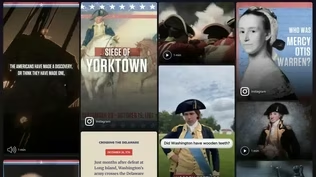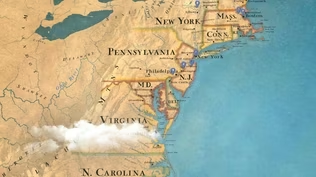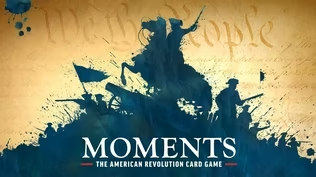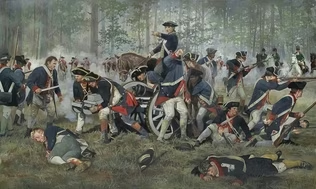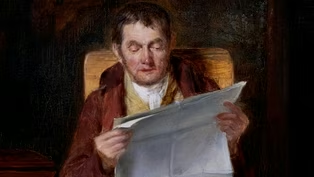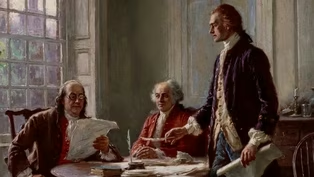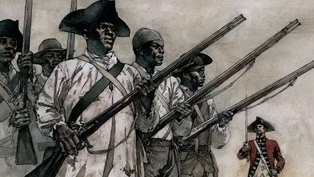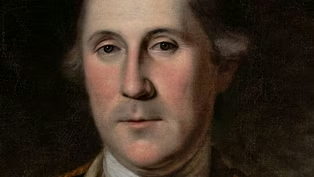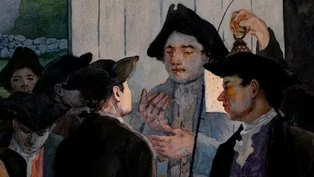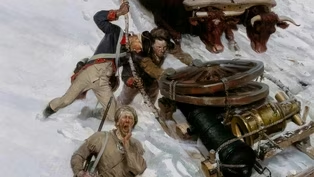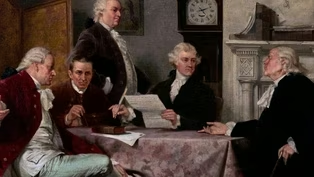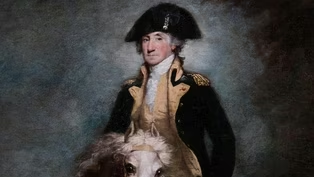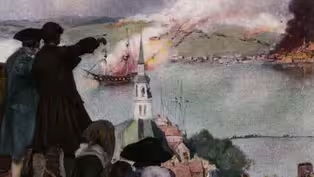
The Battle of Quebec
Clip: Episode 2 | 8m 18sVideo has Closed Captions
Benedict Arnold's army braves the fierce winter to attack Quebec City in Canada.
Benedict Arnold leads his army north up the Kennebec River as part of the American invasion of Canada. His forces lose much of their provisions and face terrible winter weather, causing many to turn back. Benedict Arnold's force launches an assault on their target, Quebec City, on New Year's Eve that turns disastrous for the Patriots.
Problems playing video? | Closed Captioning Feedback
Problems playing video? | Closed Captioning Feedback
Episodes presented in 4K UHD on supported devices. Corporate funding for THE AMERICAN REVOLUTION was provided by Bank of America. Major funding was provided by The Better Angels Society and...

The Battle of Quebec
Clip: Episode 2 | 8m 18sVideo has Closed Captions
Benedict Arnold leads his army north up the Kennebec River as part of the American invasion of Canada. His forces lose much of their provisions and face terrible winter weather, causing many to turn back. Benedict Arnold's force launches an assault on their target, Quebec City, on New Year's Eve that turns disastrous for the Patriots.
Problems playing video? | Closed Captioning Feedback
How to Watch The American Revolution
The American Revolution is available to stream on pbs.org and the free PBS App, available on iPhone, Apple TV, Android TV, Android smartphones, Amazon Fire TV, Amazon Fire Tablet, Roku, Samsung Smart TV, and Vizio.
Buy Now
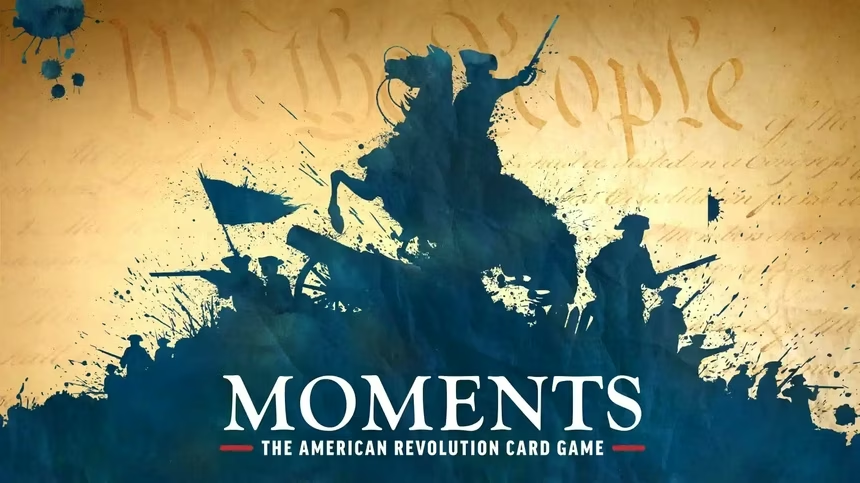
MOMENTS: The Revolutionary War Card Game
Use your knowledge of Revolutionary-era moments to build a timeline of real historical events.Providing Support for PBS.org
Learn Moreabout PBS online sponsorship[Bird cawing] Voice: Our commander, Arnold, was of a remarkable character.
Brave and beloved by the soldiery, he possessed great powers of persuasion.
Private John Joseph Henry.
♪ Narrator: Benedict Arnold and his men had made slow progress on their way up the Kennebec River as part of the American invasion of Canada.
Their provisions had been packed into 220 flat-bottomed "bateaux," built for them at George Washington's orders.
All Arnold knew about the forests his men were about to penetrate came from a crude 15-year-old British map that seemed to suggest Quebec City was 180 miles away and could be reached in just 20 days.
♪ The real distance turned out to be 270 miles.
[Wind blowing] Nothing could have prepared Arnold for the ordeal he and his men were about to endure.
[Water spraying] The Kennebec turned out to be punctuated by waterfalls and rapids.
Submerged rocks tore the bottoms of their boats.
Within 72 hours, 1/4 of their provisions were lost or ruined.
In the mornings, wet clothes were glazed with ice, one man wrote, thick as a pane of glass.
On the 10th day, Arnold began rationing the remaining food-- just salt pork and flour.
It snowed on the 19th day and rained relentlessly for days afterwards.
Then, it snowed again.
Philbrick: America is this huge continent.
There's tornadoes, there's hurricanes, there's winter storms.
Turns of weather that we know are coming for weeks on end hit the people of the 18th century completely by surprise.
They're not just fighting each other.
In a profound way, they are fighting the American climate and geography and topography.
This is a difficult place to conduct a war.
♪ Narrator: After a month of hardship, the officer leading the battalion that had been bringing up the rear declared the mission suicidal, turned his 300 men around, and started for home with many of the remaining provisions.
♪ Arnold's men were now forced to subsist on candles, tree bark, and soup made by boiling rawhide.
One company killed and ate their captain's Newfoundland dog.
♪ Of the 1,100 men who set out from Cambridge, more than 1/3 had turned back, been escorted home as invalids, or died along the way.
[Bell rings] Finally, 45 days after setting off--not 20-- Arnold's men saw the spires and walls of Quebec City looming across the St.
Lawrence River.
Philbrick: No one, particularly the British, can believe that suddenly they are there.
Arnold, because of this, would have a reputation now.
He would be known as the "American Hannibal" for his ability to move men over mountains, to achieve seemingly impossible things.
Narrator: Meanwhile, American forces led by General Montgomery had easily taken Montreal.
Then, with 300 of his men, Montgomery set out along the St.
Lawrence to meet up with Arnold.
Together, they planned their assault on Quebec City.
They realize that they've got a hard decision to make.
We either attack now, or many of our men are going to leave.
Their enlistments are up.
They're cold.
It's mid-winter in Canada.
♪ Narrator: There were only some 300 British regulars stationed in the fortified city.
So, General Guy Carleton, the royal governor of Canada, ordered every able-bodied man within its walls to prepare for battle.
Anyone who refused had to leave or be prosecuted as a spy.
The city's ramparts were soon guarded by some 1,800 men.
The American plan called for two small, noisy diversionary feints to draw defenders away from the attack's real targets.
Meanwhile, Arnold and his men would circle around Quebec City from the north, while General Montgomery would approach from the south.
Together, they would storm the citadel's steep walls.
♪ Voice: Dear Father, if you receive this letter, it will be the last this hand will ever write you.
Heaven only knows what will be my fate.
But whatever it may be, I cannot resist the inclination I feel to assure you that in this cause I feel no reluctance to venture a life, which I consider as only lent to be used when my country demands it.
Your very affectionate son, John Macpherson.
[Wind blowing] Voice: The storm was outrageous.
Covering the locks of our guns with the lapels of our coats and holding down our heads... [Gunshot] we ran in single file.
John Joseph Henry.
[Men shouting, gunfire] Narrator: The Americans launched their attack at 4 in the morning on December 31st, 1775, under the cover of a howling blizzard.
Many men had pinned to their hats slips of paper with the words "Liberty or Death."
[Gunfire] Everything went wrong.
[Gunfire continues] The diversionary attacks fooled no one.
Arnold's men came under merciless fire from the ramparts above-- and the enemy had placed formidable barricades in their way.
[Gunshot] When a ricocheting bullet fragment tore through Arnold's left leg, he had to be carried back to camp.
Captain Daniel Morgan of Virginia took over.
He managed to lead his men past one barricade only to be blocked by another.
He tried 4 times to scale it, then decided to wait for Montgomery and his men to break through.
♪ But Montgomery never made it.
[Gunshot] Within moments of making his way into the city, he, John Macpherson, and 11 others were killed.
[Gunfire] Voice: The enemy, having the advantage of the ground in front, a vast superiority of numbers, and dry and better arms, gave them an irresistible power.
About 9:00 a.m., it was apparent to all of us that we must surrender.
[John Joseph Henry] ♪ Narrator: 30 Americans lay dead.
389 were taken prisoner, including Daniel Morgan.
♪ Arnold, though badly wounded, was not captured and vowed to try to take the city again before it could be reinforced.
Voice: I have no thoughts of leaving this proud town, until I first enter it in triumph.
Providence, which has carried me through so many dangers, is still my protection.
Benedict Arnold.
"Common Sense" and the Birth of a New World
Video has Closed Captions
Clip: Ep2 | 6m 36s | "Common Sense" awakens the American colonies to the idea of true independence. (6m 36s)
The Declaration of Independence & Birth of the United States
Video has Closed Captions
Clip: Ep2 | 11m 47s | Thomas Jefferson writes the Declaration of Independence and proclaims all men are created equal. (11m 47s)
Dunmore's Proclamation & Black Americans in the Revolution
Video has Closed Captions
Clip: Ep2 | 9m 20s | Royal governor Lord Dunmore offers freedom to enslaved people that fight their Patriot masters. (9m 20s)
George Washington: Farmer, Patriot, Commander
Video has Closed Captions
Clip: Ep2 | 4m 56s | George Washington assumes command of the Continental Army and must turn it into a unified force. (4m 56s)
John Peters... an enemy to Congress?
Video has Closed Captions
Clip: Ep2 | 2m 5s | John Peters was the most respected man in his small settlement until the First Continental Congress. (2m 5s)
One of the Most Extraordinary Expeditions in American History
Video has Closed Captions
Clip: Ep2 | 6m 56s | Henry Knox leads a daring expedition to deliver artillery from Fort Ticonderoga to Boston. (6m 56s)
Preview: An Asylum for Mankind
Video has Closed Captions
Preview: Ep2 | 30s | Washington takes command of the Continental Army. Congress declares American independence. (30s)
Video has Closed Captions
Clip: Ep2 | 52s | Extolling Washington's qualities in leadership, command and mental faculties. (52s)
Bunker Hill Aftermath, June 17, 1775
Video has Closed Captions
Clip: Ep2 | 57s | On June 17, 1775, the British took the high ground, but at tremendous cost. (57s)
Providing Support for PBS.org
Learn Moreabout PBS online sponsorshipSupport for PBS provided by:
Episodes presented in 4K UHD on supported devices. Corporate funding for THE AMERICAN REVOLUTION was provided by Bank of America. Major funding was provided by The Better Angels Society and...

